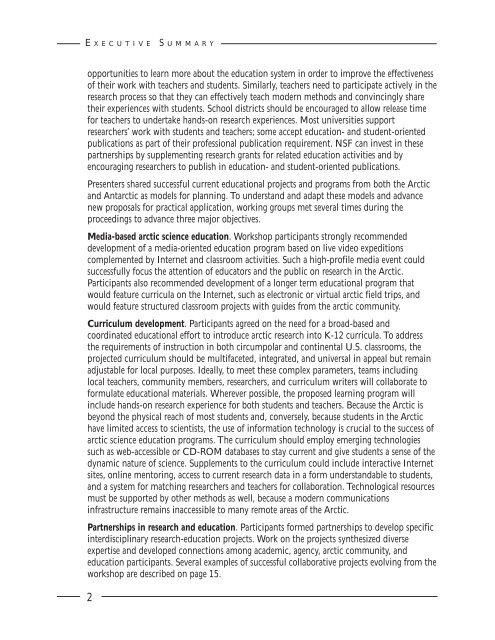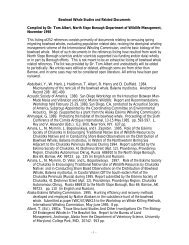ed report 4 page cover - Arctic Research Consortium of the United ...
ed report 4 page cover - Arctic Research Consortium of the United ...
ed report 4 page cover - Arctic Research Consortium of the United ...
You also want an ePaper? Increase the reach of your titles
YUMPU automatically turns print PDFs into web optimized ePapers that Google loves.
E X E C U T I V E S U M M A R Y<br />
opportunities to learn more about <strong>the</strong> <strong>ed</strong>ucation system in order to improve <strong>the</strong> effectiveness<br />
<strong>of</strong> <strong>the</strong>ir work with teachers and students. Similarly, teachers ne<strong>ed</strong> to participate actively in <strong>the</strong><br />
research process so that <strong>the</strong>y can effectively teach modern methods and convincingly share<br />
<strong>the</strong>ir experiences with students. School districts should be encourag<strong>ed</strong> to allow release time<br />
for teachers to undertake hands-on research experiences. Most universities support<br />
researchers’ work with students and teachers; some accept <strong>ed</strong>ucation- and student-orient<strong>ed</strong><br />
publications as part <strong>of</strong> <strong>the</strong>ir pr<strong>of</strong>essional publication requirement. NSF can invest in <strong>the</strong>se<br />
partnerships by supplementing research grants for relat<strong>ed</strong> <strong>ed</strong>ucation activities and by<br />
encouraging researchers to publish in <strong>ed</strong>ucation- and student-orient<strong>ed</strong> publications.<br />
Presenters shar<strong>ed</strong> successful current <strong>ed</strong>ucational projects and programs from both <strong>the</strong> <strong>Arctic</strong><br />
and Antarctic as models for planning. To understand and adapt <strong>the</strong>se models and advance<br />
new proposals for practical application, working groups met several times during <strong>the</strong><br />
proce<strong>ed</strong>ings to advance three major objectives.<br />
M<strong>ed</strong>ia-bas<strong>ed</strong> arctic science <strong>ed</strong>ucation. Workshop participants strongly recommend<strong>ed</strong><br />
development <strong>of</strong> a m<strong>ed</strong>ia-orient<strong>ed</strong> <strong>ed</strong>ucation program bas<strong>ed</strong> on live video exp<strong>ed</strong>itions<br />
complement<strong>ed</strong> by Internet and classroom activities. Such a high-pr<strong>of</strong>ile m<strong>ed</strong>ia event could<br />
successfully focus <strong>the</strong> attention <strong>of</strong> <strong>ed</strong>ucators and <strong>the</strong> public on research in <strong>the</strong> <strong>Arctic</strong>.<br />
Participants also recommend<strong>ed</strong> development <strong>of</strong> a longer term <strong>ed</strong>ucational program that<br />
would feature curricula on <strong>the</strong> Internet, such as electronic or virtual arctic field trips, and<br />
would feature structur<strong>ed</strong> classroom projects with guides from <strong>the</strong> arctic community.<br />
Curriculum development. Participants agre<strong>ed</strong> on <strong>the</strong> ne<strong>ed</strong> for a broad-bas<strong>ed</strong> and<br />
coordinat<strong>ed</strong> <strong>ed</strong>ucational effort to introduce arctic research into K-12 curricula. To address<br />
<strong>the</strong> requirements <strong>of</strong> instruction in both circumpolar and continental U.S. classrooms, <strong>the</strong><br />
project<strong>ed</strong> curriculum should be multifacet<strong>ed</strong>, integrat<strong>ed</strong>, and universal in appeal but remain<br />
adjustable for local purposes. Ideally, to meet <strong>the</strong>se complex parameters, teams including<br />
local teachers, community members, researchers, and curriculum writers will collaborate to<br />
formulate <strong>ed</strong>ucational materials. Wherever possible, <strong>the</strong> propos<strong>ed</strong> learning program will<br />
include hands-on research experience for both students and teachers. Because <strong>the</strong> <strong>Arctic</strong> is<br />
beyond <strong>the</strong> physical reach <strong>of</strong> most students and, conversely, because students in <strong>the</strong> <strong>Arctic</strong><br />
have limit<strong>ed</strong> access to scientists, <strong>the</strong> use <strong>of</strong> information technology is crucial to <strong>the</strong> success <strong>of</strong><br />
arctic science <strong>ed</strong>ucation programs. The curriculum should employ emerging technologies<br />
such as web-accessible or CD-ROM databases to stay current and give students a sense <strong>of</strong> <strong>the</strong><br />
dynamic nature <strong>of</strong> science. Supplements to <strong>the</strong> curriculum could include interactive Internet<br />
sites, online mentoring, access to current research data in a form understandable to students,<br />
and a system for matching researchers and teachers for collaboration. Technological resources<br />
must be support<strong>ed</strong> by o<strong>the</strong>r methods as well, because a modern communications<br />
infrastructure remains inaccessible to many remote areas <strong>of</strong> <strong>the</strong> <strong>Arctic</strong>.<br />
Partnerships in research and <strong>ed</strong>ucation. Participants form<strong>ed</strong> partnerships to develop specific<br />
interdisciplinary research-<strong>ed</strong>ucation projects. Work on <strong>the</strong> projects syn<strong>the</strong>siz<strong>ed</strong> diverse<br />
expertise and develop<strong>ed</strong> connections among academic, agency, arctic community, and<br />
<strong>ed</strong>ucation participants. Several examples <strong>of</strong> successful collaborative projects evolving from <strong>the</strong><br />
workshop are describ<strong>ed</strong> on <strong>page</strong> 15.<br />
2




